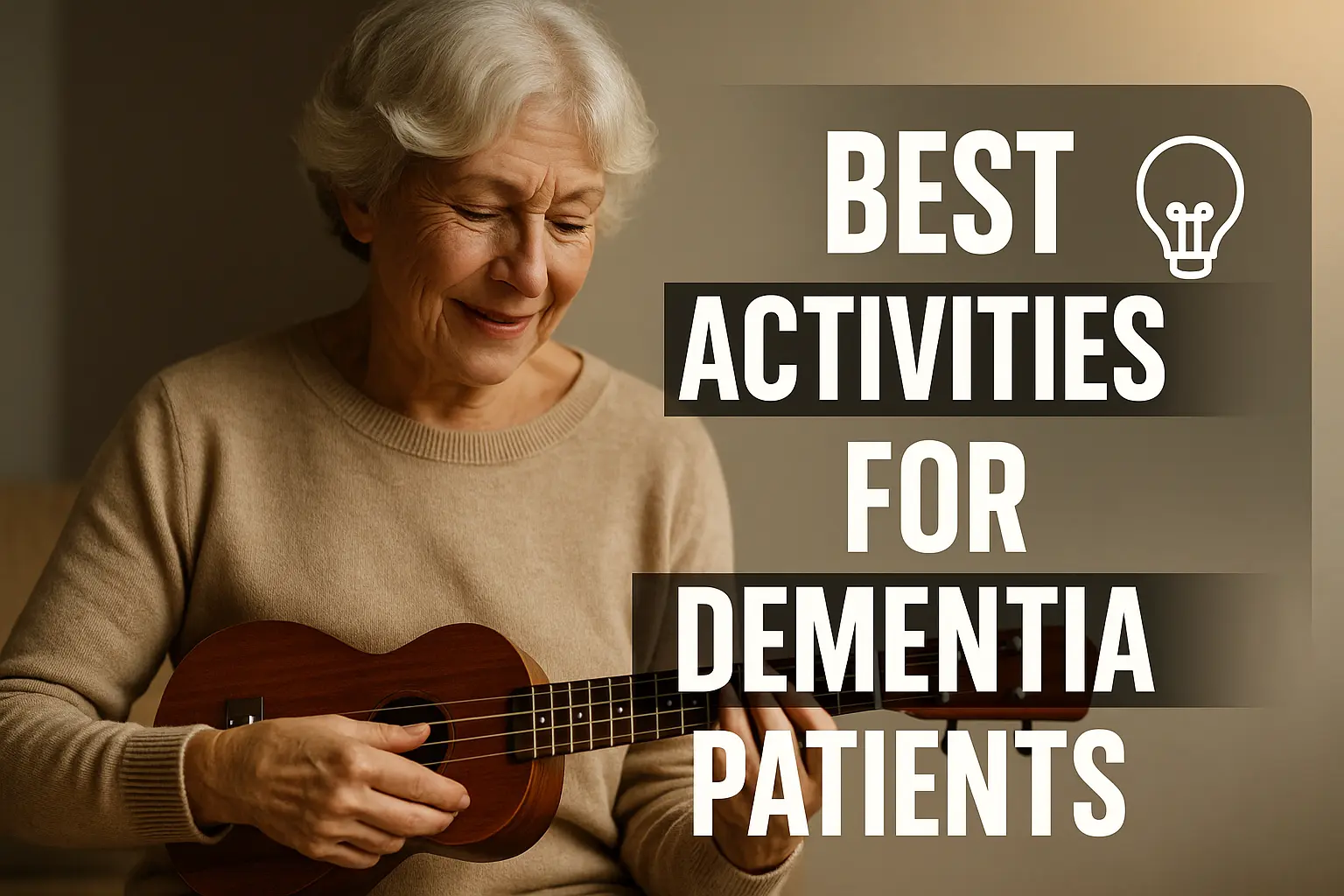Best Activities for Dementia Patients: A Complete Guide to Engagement and Well-beingA variety of disorders that impair memory reasoning and day-to-day functioning are collectively referred to as dementia. Lewy body dementia vascular dementia and Alzheimers disease are common varieties. The majority of dementia types progressively deteriorate cognitive and emotional capacities resulting in disorientation memory loss mood swings and behavioral changes though symptoms and progression differ.
Taking care of a person with dementia is more than just attending to their medical requirements. Preserving their identity and emotional health is equally crucial. That is the point at which appropriate actions are necessary. By providing meaning and enjoyment in daily life engaging activities promote mental health lessen agitation and restore dignity. This guide will explore best activities for dementia patients with complete guide to engagement and well-being.
Why Activities Matter for Dementia Patients?
A patients mental and emotional well-being is greatly impacted by meaningful activities which are more than just a way to kill time. Dementia patients still require interaction routine and purpose. Their quality of life can be considerably improved by engaging in the appropriate activities.
Mental Stimulation
Engaging in organized activities or discussions keeps the brain functioning. Many caregivers employ stress-free activities that encourage patients to use reasoning memory and decision-making abilities in order to slow dementia.
Reduced Agitation
Anxiety and frustration frequently show up as pacing screaming or withdrawal. Folding towels or arranging familiar items are examples of gentle activities that can help redirect and relax the nervous system.
Improved Mood and Confidence
A feeling of achievement from even a small task can improve someones mood and increase their sense of self-worth and independence.
Enhanced Social Connection
Activities that are conducted in groups or one-on-one give patients the chance to engage in meaningful conversation express themselves and feel heard and seen.
Physical Health
Motion promotes blood flow balance and mobility, all of which lead to improved health outcomes. To put it briefly carefully planned activities allow people to reconnect with others and themselves in addition to providing entertainment.
How to Choose the Right Activities?
Not every dementia stage is suitable for every activity. Participation is guaranteed without leading to frustration when a task is customized to the patient’s present abilities. Consider following the dementia stage to choose an appropriate activity to get the most out of that:
Early-Stage Dementia
In the early stages people can usually follow directions express their opinions and perform daily tasks. Activities ought to be just difficult enough to be enjoyable. Following are the deal options for early-stage dementia:
- Jigsaw puzzles card games and crosswords.
- Baking or preparing simple meals with help.
- Taking part in community or religious events.
- Storytelling or journalism.
Mid-Stage Dementia
At this point memory and motor skills start to decline. Activities should be straightforward but still have purpose and assistance should be offered when required. Following are the deal options for early-stage dementia:
- Painting or color-by-number assignments.
- Sorting colored blocks playing cards or coins.
- Audiobooks or reading aloud are two options.
- Using pictures or mementos for reminiscence therapy.
Late-Stage Dementia
The effects on motor and cognitive function are more severe. Late-stage dementia patients should engage in activities that are comfortable and stimulate their senses while posing as few demands as possible.
- Listening to calming music or nature sounds
- Soft-touch blankets or therapy dolls
- Watching birds, fish, or cloud movement
- Holding a warm towel or scented sachet
Focus on Familiarity and Simplicity
Activities based on their past tend to be the most effective for people with dementia. Familiar tasks can evoke reassuring memories and a sense of competence particularly when they are connected to past occupations pastimes or routines. Here are some easy activities for people with dementia:
- Sweeping the porch
- Folding napkins
- Watering plants
- Brushing a pet
Always prioritize simplicity. Anxiety or a refusal to participate can result from having too many steps or unclear instructions.
Top 10 Best Activities for Dementia Patients
Activities stimulate the senses enhance emotional health and help people rediscover their identity. These are some of the best activities for dementia patients. Here is a carefully selected list of the safest most enriching and most successful activities for different stages.
Music Therapy and Singing
One of the best non-medical treatments for dementia patients is generally acknowledged to be music therapy. Even in cases where speech is impaired music has a special ability to access long-term memory. This therapy can be done by playing well-known tunes from their upbringing or culture, during daily routines or mealtimes, singing, or making use of rhythm instruments such as drums and shakers.
Clarity and serenity can even be experienced through passive listening. Here are the following benefits:
- Stimulates memory and cognition
- Evokes emotions and reduces agitation
- Encourages movement and participation
Art and Craft Projects
Crafts for people with dementia encourage creativity improve fine motor skills and give them hands-on stimulation. The process remains the main focus instead of the outcome because there is no right or wrong way to complete it. Here are a few amazing craft ideas.
- Finger painting or sponge dabbing
- Rolling or shaping modeling clay
- Creating collages with magazine cutouts
- Decorating photo frames
Be sure to use non-toxic, easy-to-handle materials. Keep the environment calm and clutter-free.
Sensory Activities
Patients with dementia benefit from sensory activities because they help them connect with the present control their mood and lessen confusion. They are particularly helpful when cognitive and verbal abilities are impaired in late-stage dementia. For Examples:
- Feeling textured objects like silk, cotton, or sandpaper
- Smelling essential oils or herbs like lavender and rosemary
- Watching moving visuals—bubbles, lava lamps, or light projections
- Listening to rain, waves, or forest sounds
Individual preferences can be accommodated and DIY sensory kits can be used safely in the home.
Memory Games and Brain Exercises
For patients in the early and mid stages of dementia memory games are perfect. These exercises stimulate mental activity and offer modest cognitive challenges that encourage participation. Suggestions:
- Matching photo cards of family members
- Simple trivia about past events or places
- Categorizing household items (e.g., sorting by shape or color)
- “Finish the phrase” games with common sayings
Celebrate effort and participation and put more emphasis on enjoyment than memory testing.
Gentle Physical Movement
Physical activity lowers the risk of falls and promotes general health. Walking light gardening or relaxing in a park are examples of outdoor activities that help dementia patients feel less alone and stimulate their senses. Indoor options:
- Guided chair yoga or stretching routines
- Balloon toss or scarf dancing
- Seated exercises with music
- Watering indoor plants
Supervision is crucial particularly at later stages.
Conclusion
Dementia poses daily challenges but meaningful engagement can help to mitigate those challenges. A simple puzzle, a walk in the garden, or a song from their childhood can all bring connection, happiness, and purpose back into someone’s day. We recognize the value of individualized care at Precious Pearls Health Home Care.
Our kind caregivers enhance the lives of individuals with dementia by incorporating engaging therapeutic activities into each day. We support families at every stage from emotional support to personal care. To find out how Precious Pearls Health Home Care can provide individualized compassionate dementia care for your loved one get in touch with us.
FAQs
Absolutely even mild exercises like stretching or quick walks can enhance mood increase mobility and promote brain health.
Tactile crafts like finger painting, clay modeling, and folding paper are calming and easy for limited abilities.
Easy brain-teaching games that dont involve stress include memory matching sorting cards and finish-the-phrase games.






